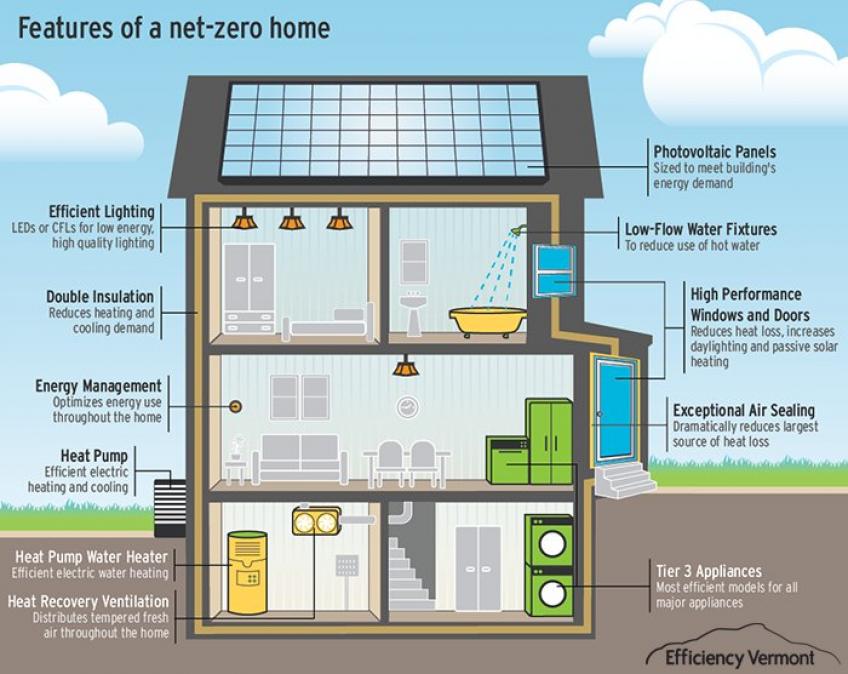Forum Explores Climate Change And Affordable Housing

Schematic of a net zero home. Photo: heartlandhomesinc.com. Creative Commons
A forum on climate change and affordable housing was held on May 25, 2021 via Zoom. The forum, which was the last of three, was sponsored by the Amherst Municipal Affordable Housing Trust, The Affordable Housing Coalition, The League of Women Voters, and the Town of Amherst. A recording of the meeting and previous forums will be posted on the Housing Trust website.
The forum was moderated by Stephanie Ciccarello, Amherst Sustainability Coordinator. She introduced the forum by pointing out that residential buildings produce 41% of the Town’s greenhouse gasses, mostly through electricity use. Making homes more efficient reduces energy cost, improves comfort, improves air quality and leads to community resilience, she said.
Bev Craig of the Massachusetts Clean Energy Center said the “Passive House” designation is the most energy efficient, five to six times more efficient than required by code. LEED buildings have been disappointing in their energy efficiency, she said. The Department of Housing and Community Development offers grants for energy efficient construction but these are very competitive, with seven times as many applicants as available grants. She said Mass Save also has a program for new construction, but there is very little money available for retrofits.
The Clean Energy Center offers a Passive House Challenge which awards up to $4000 for each unit created. So far they have sponsored eight projects in Massachusetts producing 540 units. Costs are running 1.4% to 2.8% over that of traditional buildings.
Ashley Muspratt of the Center for EcoTechnology (CET) in Pittsfield said that her organization offers energy audits at no cost. Often, energy saving measures are not expensive, such as low flow showers and weatherization, she said. Heat pumps are a very efficient means of heating and cooling and offer cost savings over oil or propane furnaces. At this time they are still more expensive than heating with natural gas. Amherst’s energy provider, Eversource, is incentivizing the installation of heat pumps with rebates.
Muspratt also described the PACE (Property Assessed Clean Energy) Program for commercial and industrial buildings. This allows property owners to finance energy efficient improvements through a lien on their tax assessment. The lien transfers with the sale of the building. According to Ciccarelli, Amherst is considering joining the PACE program in the near future.
In addition, CET offers free assistance to businesses and institutions for recycling construction materials, furniture, and composting. The organization is starting to get involved in some retrofitting of affordable housing and is the energy advisor for the supportive studio apartments proposed for 132 Northampton Road.
Local architect Jesse Selman, a member of the Energy and Climate Action Committee, interviewed Marc Sternick, an architect who has won awards for his energy efficient designs. Sternick said by looking at energy efficiency imaginatively, he has been able to come in on budget with his projects. But he also noted the need to educate the residents of buildings. He mentioned that one property owner said his building was not meeting its projected energy savings. When Sternick visited in the middle of winter, he immediately noted six open windows. He said there are sensors available that turn off the heat or air conditioning if a window is open, but these cost about $1000 per unit.
He said we need to change the narrative from affordable living that is “less bad” to that which is “healthy and inviting.” The Passive House is a “real ray of hope.” If a developer rolls the three to four percent of extra cost into a mortgage or long-term loan, it starts paying for itself immediately.
Retired Amherst architect Chris Riddle was one of the sponsors of Amherst’s net zero bylaw that requires all new or renovated public buildings costing more than $1 million to be net zero. He said we need to expand this guideline to private projects to achieve zero carbon emissions by 2050. Since over half of Amherst residents are renters, ECAC members Steve Roof and Laura Drauker said the committee is working on a means of achieving energy savings in rental units without increasing the cost to landlords or renters. Roof said that since many landlords do not pay the utilities on their buildings, they have little incentive to upgrade the efficiency. Therefore, the ECAC is thinking of linking the requirements to the rental registration permits. Drauker said the committee is also thinking of a “green lease” to incentivize both landlords and tenants. They are looking for landlords to pilot the program. The committee’s final report will be presented soon.
The ECAC is also trying to encourage net zero construction without scaring away developers. Selman said that since net zero construction is not cost prohibitive, it can be required in requests for proposals. Riddle did note a problem with condominium, cohousing, and townhouse complexes, since Eversource only allows one transformer per complex, so individual owners cannot install solar panels.
The forum ended at 8 p.m. All three forums will be reviewed at the Housing Coalition meeting on June 29.

Thanks for covering this. I hope more people will view the recording.